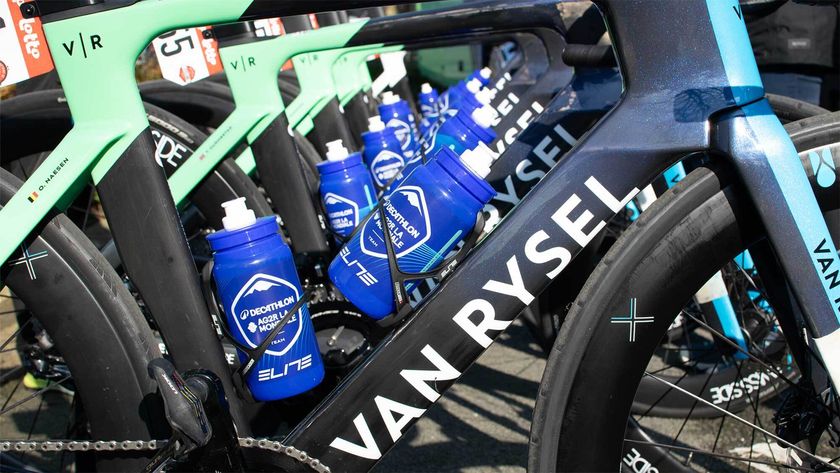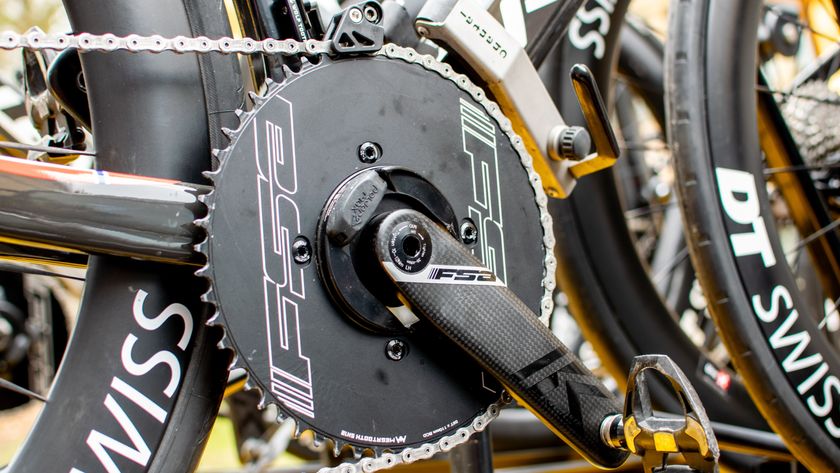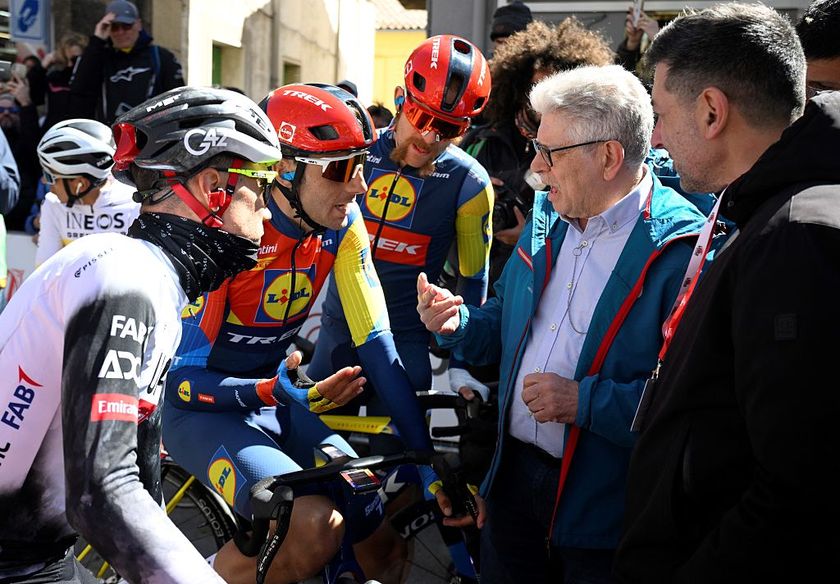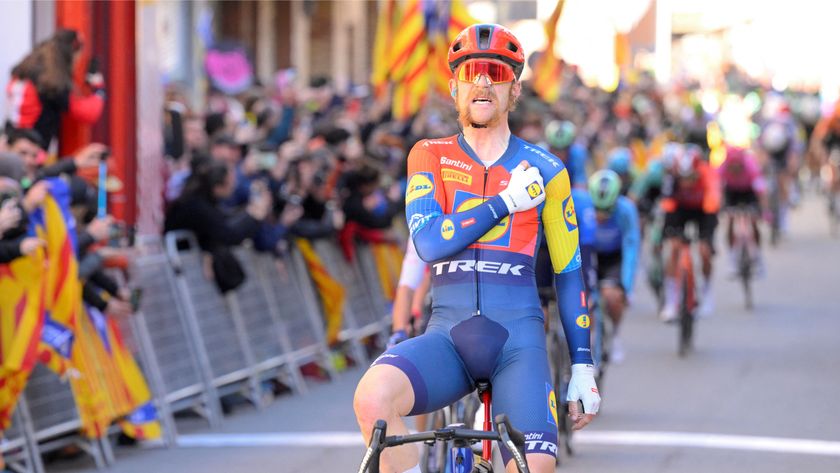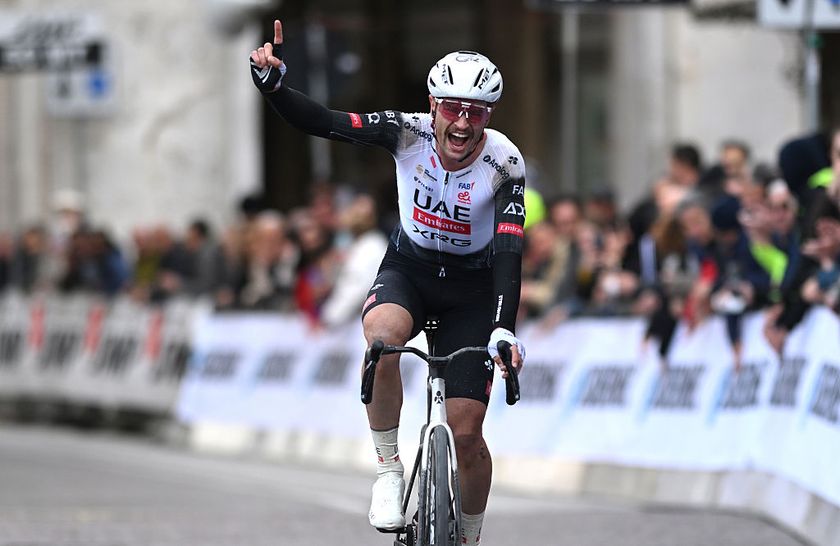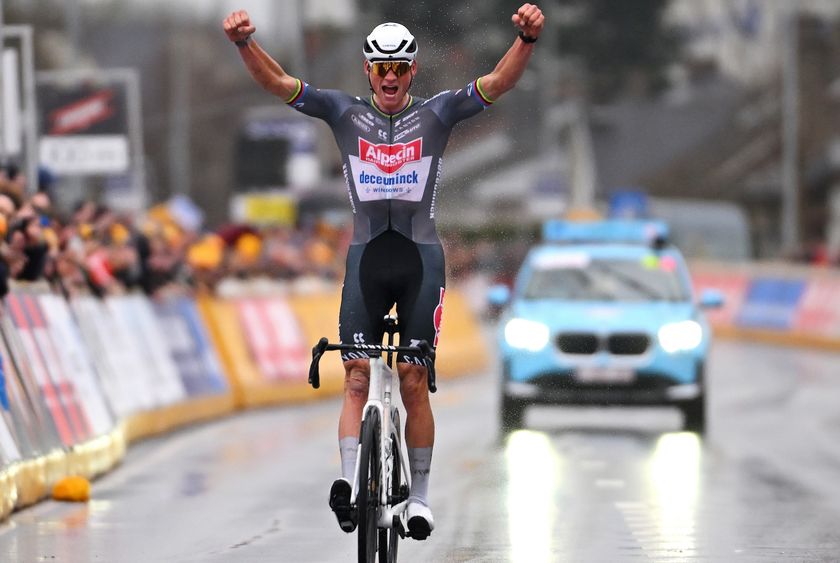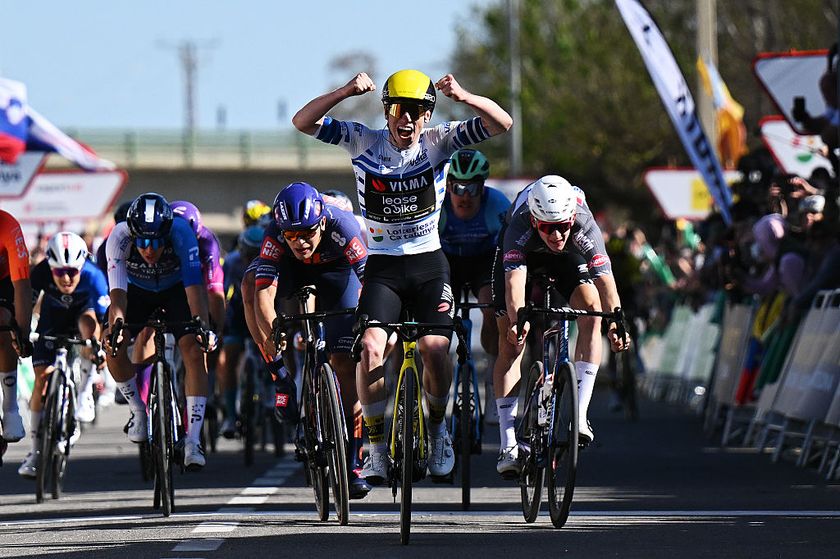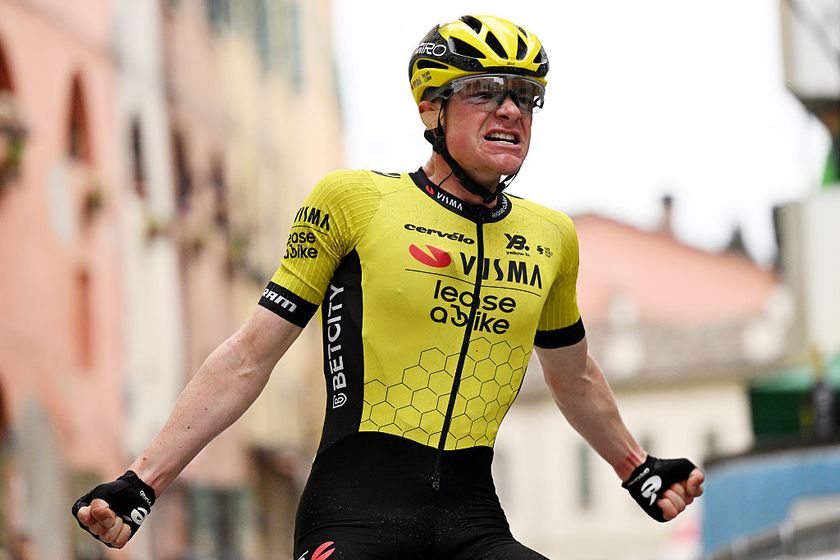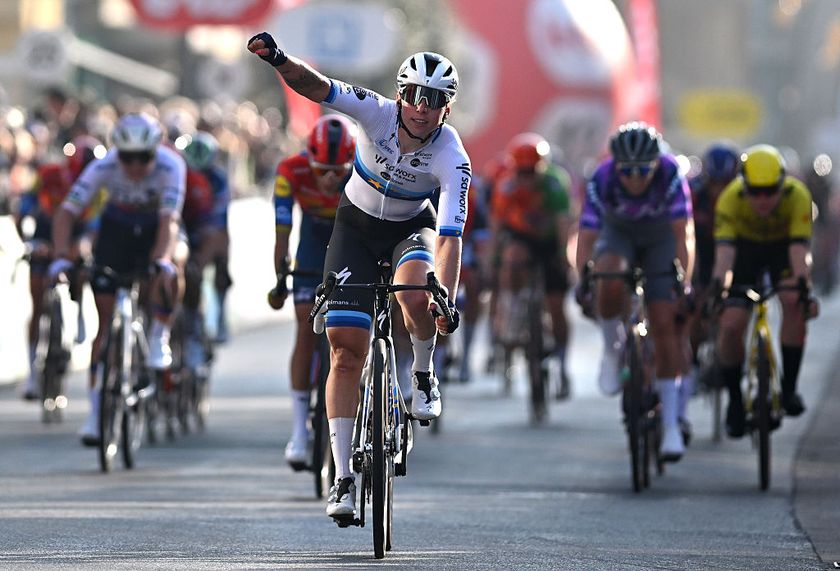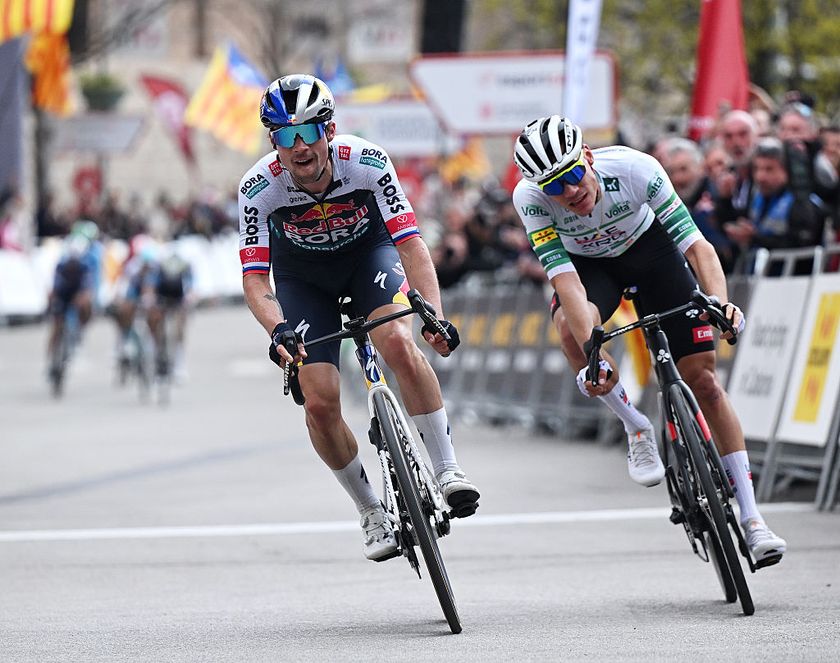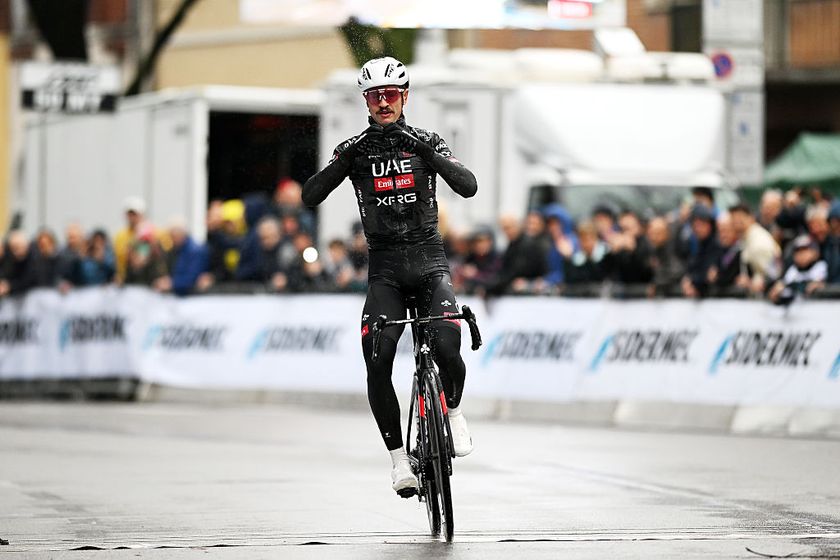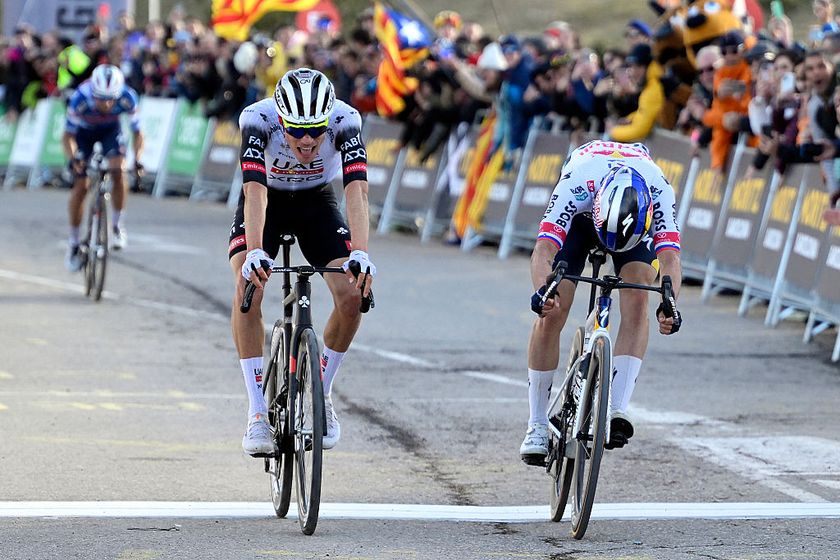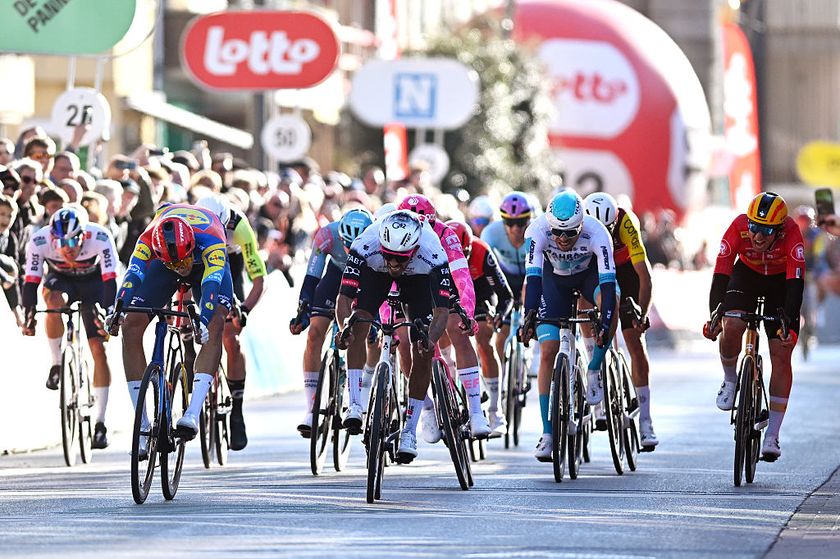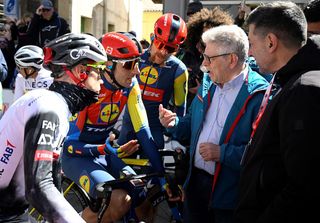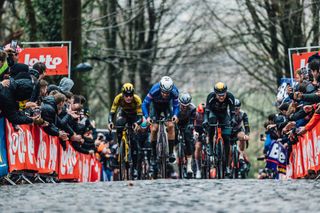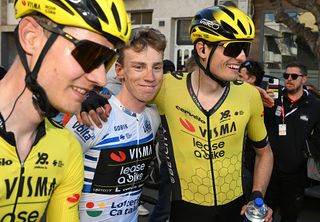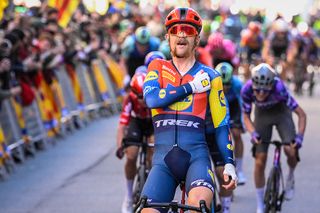Schumacher at Mach 2
From his victory two and a half weeks ago atop the Citadel de Namur to today's bellissima volata...




































Many, many metres of vertical to follow
From his victory two and a half weeks ago atop the Citadel de Namur to today's bellissima volata clocked at 68.49 kilometres per hour, it seems Stefan Schumacher can do it all.
"It's an incredible Giro for me; it's my first Giro and it's a dream at the moment," said a stunned Schumacher, lost for words to describe his elation.
"The win in Namur was great for me, it was my biggest victory in my career. For sure, it's easier if you've already won a stage, but it was also really, really difficult today.
"I had some good feelings in the last days, and I tried again to be in a breakaway to win a stage. It was really, really hard, the first 70, 80 k's, because the bunch was almost one minute behind us for a long, long time. But the last 35 k's were also super-tough."
After yesterday's stage to the Furkel Pass and seven straight days' racing, there were more than a few pairs of tired legs, but five grabbed their chance at glory in a day-long breakaway that began 150 kilometres from Gemona Del Friuli. In the final kilometres it was attack followed by attack, and in the end, 24 year-old Gerolsteiner Schumacher proved freshest and fastest of all, coming off Lampre-Fondital rider Marzio Bruseghin's wheel 150 metres from the line and powering past the Italian in a textbook sprint manoeuvre.
"I wanted it end in a sprint because I knew I could win the sprint," said Schumacher. "On the second category mountain [Cuel di Forcia], I felt really strong and after that, I was really confident; after that, I knew I was in good shape to win a stage again."
Said Bruseghin: "I tried to get away and attacked twice in the last kilometre, but Schumacher was the strongest today - he deserved to win. I wanted to have a good stage before the end of the Giro."
Asked if he ever thought about letting local lad Bruseghin win, who has come close a few times before in past Giri d'Italia, Schumacher gave a wry smile before answering: "I'm not so big that... For me, a [Grand] Tour stage is a big race - a really big race - and I don't have so many victories in my career that I can give presents," he laughed. "That was not in my head."
None of the quintet were a threat on general classification, and as a consequence, the leaderboard remained unchanged; Ivan Basso still looking resplendent, confident and pretty in pink. And given his dominance shown so far, it would take an absolute novice punter to suggest the maglia rosa or his CSC team will be threatened tomorrow.
"When you have the maglia rosa, you are only focused on keeping it. You aren't looking at the polemics on whether a stage is difficult or not too difficult; when you start the Giro, you accept the Giro for what it is and the same goes for everyone else," Basso said of today's stage.
Asked if he'll choose to ride defensively over the next days, he replied: "It will depend on my condition, how I will be and how the race [happens] - nothing is certain. I respect my rivals, they are still here, but I have a strong team and therefore I am calm; however, you always have to be attentive."
Tomorrow's mammoth is arguably the ugliest of all; a minimum seven hours in the saddle and 4,000 metres' climbing, culminating in a mountain-top finish atop the 1,918 metre-high Passo Di San Pellegrino. If that doesn't do it, Stage 20 may be the straw that breaks the camel's back - another seven hours and another 4,000 metres of vertical, with the Passo di Gavia and Passo del Mortirolo to be tackled en route.
"It's difficult to say," said Basso on which climb he feared most, "because there are a lot of mountains and anything can happen, even on a second-category climb. I hope to be able to answer the attacks, and have the same condition I've had for the last fifteen days."
And although 2,000 kilometres away, the dramatic events unfolding in Spain were hard to ignore, as Liberty Seguros terminated their sponsorship contract with Active Bay SL, the holding company of the Liberty Seguros-Würth team. Asked for a comment, Basso replied: "I am calm and focused on the Giro, I don't think about what happened in Spain. I am here and will concentrate on my Giro, that's all."
How it unfolded
On a sunny morning in Sillian's Marktplatz, 161 riders started the Giro d'Italia's Stage 18. The first attack came after 10 km from Gerolsteiner's Sven Krauss, who got a 200m lead, but Quick.Step brought him back before the Gazzetta 110 sprint in Lienz after 31 km and Bettini took the points. The riders were enjoying the Austrian mountain scenery, while 41.8 km. was covered in the first hour. T-Mobile started looking for trouble, making a lot of attacks and after 50 km, Kessler made a move, which was then countered by muleskinner Bruseghin, who went solo as the first climb up the Gaisberg Sattel approached. Plenty of riders were trying to bridge to the powerful Lampre-Fondital rider, like Jan Ullrich and Paolo Bettini.
Eventually Ivan Gutierrez Palacios (Caisse d'Epargne) and David Lopez Garcia (Euskaltel) got across to Bruseghin, and then after 60 km at the summit of Gaisberg Sattel, Stefan Schumacher had joined the escape, with the gruppo maglia rosa chasing at 0'48. Yakovlev (Liberty Seguros) and Barbero (Selle Italia) abandoned, while a counterattack went from the gruppo of Jufre Pou, Patxi Vila and Der Jan, who had ants in his legs today. Perhaps practicing for the Tour De France, CSC brought this move back, but then Charly Wegelius (Liquigas) decided to have a go at bridging across to the front group.
There were now three riders in front, as Gutierrez had a mechanical and got a bike change, then picked up Wegelius and both made it to the front of the race halfway up the climb to the Italian border atop the Passo di Monte Croce Carnico. At the summit of the 1360m ascent, the lead on the gruppo maglia rosa was just 0'42 and the average speed after two hours of racing was 37.5 km/h. Saunier Duval's Piotr Mazur abandoned, while another counterattack formed on the descent back into Italy, with two more Lampres - Valjavec and Vila, Phonak's Tschopp and Quick.Step's Spanish champ Garate. After 90 km in Timau, the counterattackers were 0'45 behind the break, with the gruppo maglia rosa at 1'30. AG2R's climber John Gadret, who has been having an excellent Giro crashed hard on the descent and abandoned, breaking his collarbone. CSC cranked up the pace behind as they didn't want three Lampre riders up the road, and after 100 km, the counterattackers were brought back and the gruppo maglia rosa then sat up.
Through the feed zone, the break quickly gained time and was now over 5'00 up. 20 km later as the escapees reached the foot of the day's second GPM, up the steep 7 km Cuel di Forcia, the gap between the break and the gruppo maglia rosa was stable at 5'40. Atop the ascent with 68 km to race, it was Schumacher took the points ahead of Bruseghin. Schumacher bombed the tricky, gravel strewn descent, and Wegelius and Lopez Garcia were split off and it took them a hard 10 km to get back on. The gruppo maglia rosa was at 7'15 and just cruising, but the steep ramps up Cuel di Forcia put Di Luca in trouble again.
The front quintet entered the last 55 km in the verdant, green landscape of Friuli and headed south and then east towards Tarcento and the difficult final 30 km. First there was the 1.4 km ascent of the final GPM up the steep slopes of Sammardenchia with 24 km to go, then across rolling terrain to the penultimate climb up the steep 1500m Montenars with 11 km. Once inside the last 5 km in Gemona di Friuli, there was another climb with a hairpin pavé curve, then a descent to the last kilometre and the finish. Phonak had hit the front to take over the chase to protect their lead on team GC and the break quickly lost a minute of their lead.
At the base of the Sammardenchia climb, the lead was down to 3'43 as Phonak was riding hard on the front. Bruseghin was leading up the steep wall, while Schumacher was just sitting back and watching for any moves. At the Sammardenchia summit, the break's lead had dropped in half over the last 30 km due to Phonak's chase and was now 3'08, but the break was working well. Phonak had stopped chasing and the lead with 20 km to go had increased as the break was still working well. But Phonak got a second wind and at Artegna with 15 km to go, the gap was 3'04 and falling fast again.
As the final climb of Montenars began, Lopez Garcia made a solo move and as the other riders were cooked, the Euskaltel man quickly got a gap. At the top of Montenars, Lopez Garcia had 0'15 on Schumacher, Bruseghin and Wegelius with 11 km to go, with Gutierrez Palacios just behind and the gruppo maglia rosa at 2'50. In Managlia at the base of the descent, Schumacher had pulled back time on the Euskaltel rider and the chasing quartet had the orange clad rider in their sights. There wasn't a great deal of collaboration, and as Lopez Garcia entered the centre of Gemona di Friuli, Schumacher had gotten across to him with some more great descending. Bruseghin and Wegelius dumped Gutierrez Palacios and desperately tried to get across to the front duo with 4 km to go, but at the top of the ascent, Gutierrez Palacios blasted across from behind.
On the last 2 km descent, all five were back together and Lopez Garcia went again, but the powerful Schumacher brought him back. Then Gutierrez Palacios went and was brought back, provoking a good move from Wegelius, but once again it was the German who brought him back. In the last kilometre, Bruseghin went twice but Schumacher was just too fast for the rest and took the win. Today, it was just not to be for muleskinner Marzio, still seeking his first career victory after a decade in the pro peloton. 2'50 behind the break, Bettini was sixth ahead of Milram's Ongarato and Discovery Channel's Matty White.
Stage 19 - Friday, May 26: Pordenone-Passo di San Pellegrino, 220 km
This may be the hardest stage of '06 Giro, with 7 hours of racing and 4000m of climbing on the program. First on the menu for Friday is the Forcella Staulanza, the steep back to back Passo Fedaia and Passo Pordoi, then loops back around the heart of the Dolomiti for the difficult ascent to Passo di San Pellegrino, where the steep last 7 km will certainly break things up. Strong man Basso will look to show he's the main man at the 2006 Giro d'Italia.
Get The Leadout Newsletter
The latest race content, interviews, features, reviews and expert buying guides, direct to your inbox!
Latest on Cyclingnews
-
'Like the last day of a Grand Tour' - radically changed Volta a Catalunya mountain stage leaves peloton perplexed and disappointed
Volta a Catalunya now looks to Montjuïc to resolve GC struggle between Ayuso and Roglič -
How to watch Gent-Wevelgem 2025 – Live streams, TV channels
All the broadcast information for one of the biggest cobbled Classics on March 30 -
Double Volta a Catalunya stage winner Matthew Brennan pulls out of race to avoid overexertion, team reports
19-year-old will return to racing at Limberg on April 16, likely to race Tour de Romandie -
'Riders need to learn to stand together' - Quinn Simmons claims first WorldTour win at Volta a Catalunya after team voted not to race in high winds
American outpowers pack on uphill finish after bizarre 25-kilometre race
